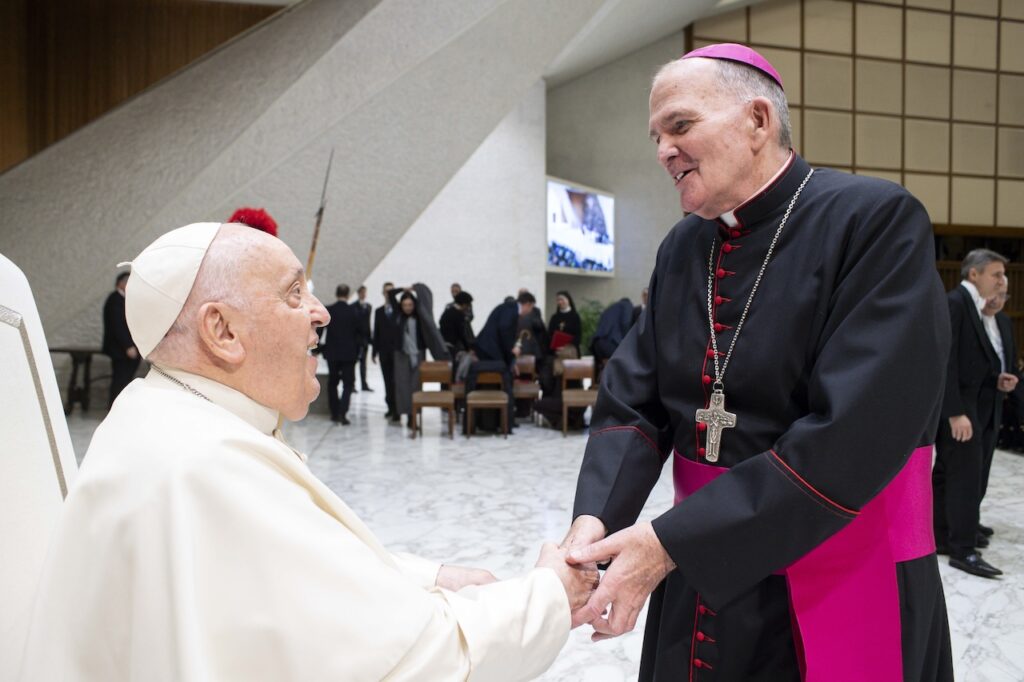TRENTON, N.J. (OSV News) — Bishop David M. O’Connell of Trenton was released from the Cardiac Care Unit of Santo Spirito Hospital in Rome Jan. 9.
He is expected to return to New Jersey later in the week as planned with the priests of the diocese who had been on pilgrimage, according to The Monitor, Trenton’s diocesan news outlet. He will continue his recovery, along with rehabilitation, at home upon his return.
Bishop O’Connell, 68, was hospitalized after suffering a heart attack Jan. 4 due to a blockage of the largest cardiac artery. He underwent an emergency procedure to open the artery and has been recovering in Santo Spirito, first in intensive care and then, as of Jan. 7, in the Cardiac Care Unit.
Bishop O’Connell had been in Rome a few days ahead of the Jan. 4 arrival of some 20 priests of the diocese for a planned pilgrimage. During his hospitalization he expressed regret that he wasn’t able to be with the priests but enjoyed receiving their photos and stories, “and was very happy that they were having a good pilgrimage experience,” The Monitor said.
In a Jan. 9 email sent to diocesan curia members, Bishop O’Connell said that he felt “very lucky” to have received care so quickly following his heart attack. He also gratefully acknowledged that he has received hundreds of get-well wishes from throughout the diocese and the wider church. He again thanked everyone for their support and prayers.
While he was still recovering in the hospital, Bishop O’Connell wrote a column for The Monitor. Looking out the window of his room in Santo Spirito’s cardiac care wing, he could see “the dome of St. Peter’s Basilica close by,” he noted.
“For those who live here, this is an ‘ordinary’ although still spectacular view. For me it is a powerful reminder of the faith of the Roman Catholic Church at its center,” he said.
“A bishop is referred to as a ‘successor to the apostles,’ a title that is as humbling as it is instructive,” he wrote. “It is amazing for me to consider the fact that I almost lost my life during the past few days in the same city and burial place of the apostles, although without any act of apostolic heroism or spiritual determination.
“I simply had a heart attack while visiting the eternal city, nothing more profound than that, an experience some might call commonplace or ‘ordinary’ among men my age. I can assure you, however, that my thoughts in these days — and the incredible response of so many wonderfully concerned people to my experience — have been anything but ‘ordinary.'”
Bishop O’Connell reflected on what is now “Ordinary Time” in the church’s liturgical year, with the Christmas season “behind us.”
“In our vernacular usage, the word ‘ordinary’ describes what is commonplace, ‘everyday’ or without uniqueness or special distinction,” he said, but what takes place in the church’s official prayer during “Ordinary Time” is “anything but ordinary,” as Jesus’ life unfolds in Masses, Scripture readings and prayers over the weeks ahead.
“With all that in mind, Catholics should use ‘Ordinary Time’ to deepen their faith in the Lord Jesus Christ and his Gospel, to nourish their reading and understanding of the Word of God, to enhance and grow in their spiritual lives and prayer and to strive for personal conversion,” Bishop O’Connell said.
“‘Ordinary Time’ should be the opportunity,” he continued, “to make progress in putting the Catholic faith into action with ongoing works of charity toward others, respect for and protection of human life in all its stages, support for marriage and family life, respect for the environment as our ‘common home,’ and personal witness to the Lord Jesus Christ.”
He added, “One’s experience need not and hopefully will not be as dramatic as mine has been these last few days. It can and, indeed, will be more ‘ordinary.’ But ‘Ordinary Time’ can and will take on special spiritual significance if we live it ‘intentionally.'”

